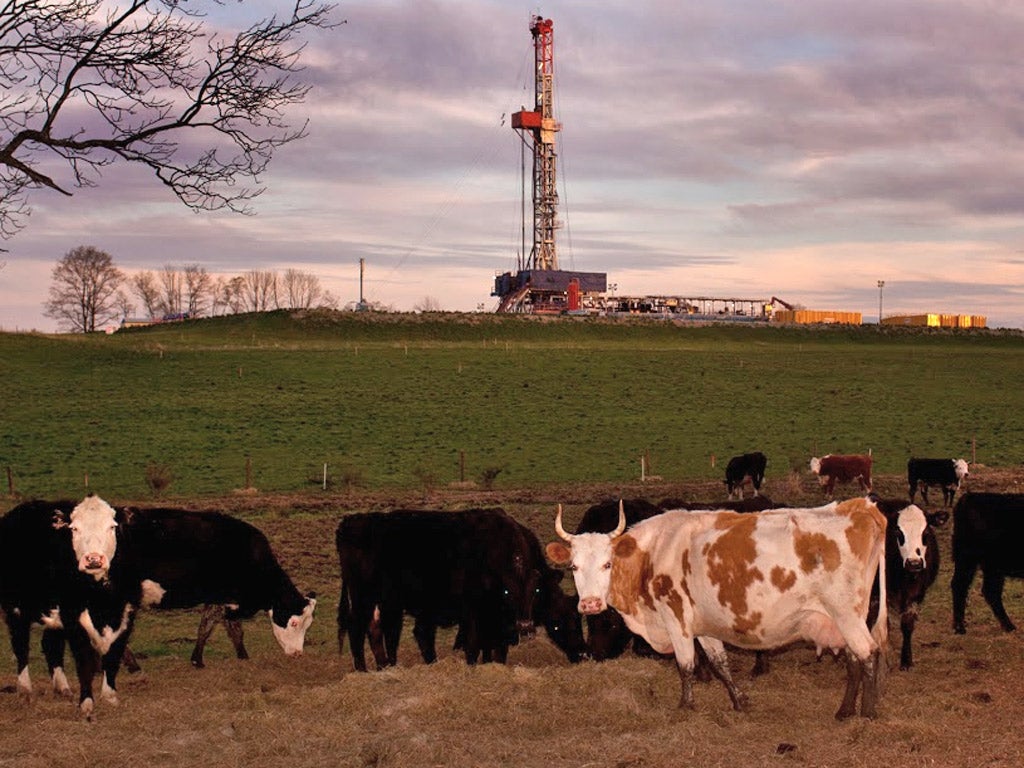Greenpeace: Landowners can work together to block fracking 'trespass'
Campaigners change tack in fight against fracking

Your support helps us to tell the story
From reproductive rights to climate change to Big Tech, The Independent is on the ground when the story is developing. Whether it's investigating the financials of Elon Musk's pro-Trump PAC or producing our latest documentary, 'The A Word', which shines a light on the American women fighting for reproductive rights, we know how important it is to parse out the facts from the messaging.
At such a critical moment in US history, we need reporters on the ground. Your donation allows us to keep sending journalists to speak to both sides of the story.
The Independent is trusted by Americans across the entire political spectrum. And unlike many other quality news outlets, we choose not to lock Americans out of our reporting and analysis with paywalls. We believe quality journalism should be available to everyone, paid for by those who can afford it.
Your support makes all the difference.Householders are being urged to block plans for widescale fracking in Britain by denying permission for drilling companies to extract oil and gas from underneath their homes.
Environmental group Greenpeace is calling on local residents who oppose shale gas or oil exploitation near them to join together to assert, what they claim, are common law rights to forbid the “trespass” of energy firms from conducting activities below their property.
The legal challenge, which was launched in Preston, Lancashire, was joined by residents from the Fylde and campaigners from Balcombe, West Sussex, who have been fighting Cuadrilla over energy exploration close to their communities.
Lawyers for Greenpeace claim that a Supreme Court ruling in 2010 in which Mohammed Al-Fayed sought a share of the proceeds from an energy firm after it drilled for oil under his Surrey estate paves the way for mass action by concerned citizens.
Five justices rejected the former Harrods owners’ demands for compensation and damages but unanimously upheld the claim of trespass.
Environmentalists said that ordinary homeowners must give their permission before horizontal drilling - which could see gas removed from under their land - can begin close by and claimed that the industry is planning to ride roughshod over individual rights in the dash to recover oil and gas
However, the industry group representing operators described the challenge as “extremely misleading”. The UK Onshore Operators Group said in a statement: “Operators in this country are abiding by the law, which states that activities at depths of over a mile under the ground do not impact landowners. However, in line with the law, operators will inform all landowners in a very clear and transparent manner.”
Under UK law, underground resources are the property of the Crown. The Government is in the process of issuing a 14 round of licences for petrochemicals which campaigners say will cover two thirds of England. Green groups fear it could lead to mass industrialisation of the countryside whilst polluting water and air around exploration sites.
A moratorium on fracking activities – which involves fracturing gas-rich shale rock with water, sand and chemicals - was lifted in 2012 following concerns over two seismic events around Blackpool.
The Government remains keenly committed to exploiting unconventional energy reserves. This summer the British Geological Survey estimated 130 trillion cubic feet of shale gas could be recoverable onshore, mainly from across the north of England - the equivalent of 40 years of UK supplies.
Greenpeace spokeswoman Anna Jones however said fracking was a "desperate ploy" by the Government to keep the UK hooked on fossil fuels.
She said: "Fracking is risky for local environments, risky for our water supplies and risky for the global climate. People are right to stand up and say 'not under my land you don't'."
Andrew Pemberton, a Lancashire dairy farmer said he was worried for the ecology of the Fylde near Blackpool and would be joining the protest. "I'm supplying milk to 3,000 households, and if for any reason my water became contaminated, my business would be ruined and my livelihood destroyed, as well as the livelihoods of the 16 families who work for me. Fracking is dangerous and short-sighted. We should be keeping this gas in the ground,” he said.
Francis Egan, Cuadrilla CEO, said: "This country pioneered subsurface infrastructure. All of our existing subsurface underground rail, water, gas, telecommunications and electric development has historically succeeded in legal coexistence with surface property rights. Newer technology such as geothermal energy and carbon capture and storage will also have to negotiate this.”
Join our commenting forum
Join thought-provoking conversations, follow other Independent readers and see their replies
Comments